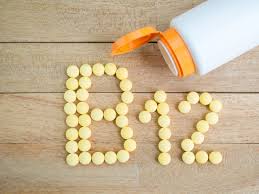
What Happens to Your Body When You Lack Vitamin B12?
Vitamin B12, also known as cobalamin, is a powerhouse nutrient that plays a vital role in keeping your body healthy — from producing red blood cells to supporting your brain and nervous system. Yet, it’s one of the most common nutrient deficiencies worldwide, especially among vegetarians, vegans, and older adults.
Let’s break down what happens to your body when you don’t get enough of it.
1. Fatigue and Weakness
One of the earliest signs of B12 deficiency is constant tiredness. This is because B12 helps your body produce healthy red blood cells, which carry oxygen throughout the body. Without enough oxygen supply, you may feel drained even after a full night’s sleep.
2. Pale or Jaundiced Skin
Low B12 can cause red blood cells to become fragile and break apart, leading to anemia. This often results in pale skin or a slight yellowish tint, also called jaundice.
3. Tingling Sensations & Nerve Problems
B12 is crucial for maintaining the protective myelin sheath around your nerves. Without it, you may experience:
- Tingling or “pins and needles” in hands and feet
- Numbness
- Poor balance and coordination
4. Mood Changes and Memory Issues
Low B12 levels have been linked to depression, irritability, and even memory loss. Since B12 is essential for neurotransmitter production, a lack of it can affect mood regulation and brain function.
5. Shortness of Breath & Dizziness
Due to reduced oxygen transport in the blood, you might feel breathless during activities that were once easy, like climbing stairs or light exercise.
6. Mouth and Tongue Changes
A sore, red, and swollen tongue (glossitis) or frequent mouth ulcers can be signs of B12 deficiency.
Who’s at Risk?
- Vegetarians & vegans (B12 is mostly found in animal-based foods)
- People over 50 (reduced stomach acid affects absorption)
- Those with digestive disorders like celiac or Crohn’s disease
- Individuals who have had weight-loss surgery
How to Prevent B12 Deficiency
- Eat B12-rich foods: Meat, fish, eggs, dairy, and fortified cereals.
- Consider supplements: Vitamin B12 tablets, capsules, or injections.
- Get regular checkups: A simple blood test can detect deficiency early.
Bottom Line:
Vitamin B12 deficiency can creep up slowly but cause serious long-term damage if left untreated. If you notice symptoms like constant fatigue, tingling in your hands or feet, or mood changes, it’s worth getting your B12 levels checked.